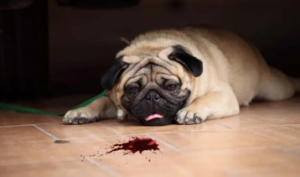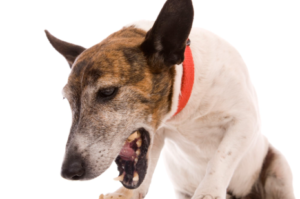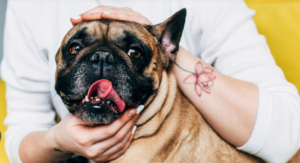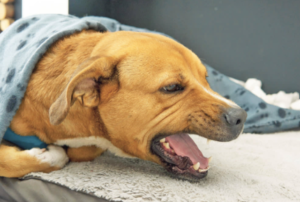A Dog is coughing up blood it is alarming, and as a pet owner, it’s natural to feel panicked and concerned. If your dog is experiencing this, it’s crucial to act promptly while understanding the possible causes and solutions. In this article, we will delve into why dogs might cough up blood, what immediate actions you should take, and how to prevent it in the future.
Understanding the Medical Term: Hemoptysis
Coughing up blood in dogs is medically termed “hemoptysis.” This condition occurs when blood is expelled from the respiratory tract, including the nose, throat, windpipe, or lungs. Hemoptysis can range from small streaks of blood in the mucus to significant quantities of blood, and its causes can vary from minor to life-threatening.
Why is My Dog Coughing Up Blood?

To fully address this concern, it’s essential to understand the potential causes. Hemoptysis is a symptom rather than a disease itself, and pinpointing the root cause is critical for effective treatment.
1. Respiratory Infections
Respiratory infections are one of the most common causes of hemoptysis in dogs. Bacterial, viral, or fungal infections can irritate and inflame the respiratory tract, causing minor to significant bleeding. Conditions like kennel cough, pneumonia, or bronchitis often lead to persistent coughing that may eventually produce blood.
- Kennel Cough: A highly contagious infection, kennel cough is characterized by a dry, hacking cough. In severe cases, this can irritate the airways, leading to blood-tinged sputum.
- Pneumonia: This infection inflames the lungs, causing symptoms like coughing, fever, and difficulty breathing. Advanced pneumonia may result in blood being coughed up.
2. Foreign Objects in the Airway
Dogs are naturally curious and often sniff or chew on objects. Small toys, sticks, plant matter, or even food can become lodged in the throat or airways, leading to irritation, injury, or bleeding. Sharp objects, in particular, can cause significant trauma and bleeding.
3. Trauma or Physical Injury
Injuries to the chest or throat can result in internal bleeding, which might be expelled as bloody sputum. Trauma can occur from accidents such as being hit by a car, falling, or fights with other animals. Even seemingly minor injuries can lead to serious internal damage.
4. Lung Diseases and Disorders
Several lung conditions can cause coughing up blood in dogs:
- Lung Cancer: Tumors in the lungs can rupture or bleed, causing hemoptysis. This is more common in older dogs.
- Bronchitis: Chronic bronchitis can damage the airways, leading to occasional bleeding.
- Pulmonary Edema: Fluid accumulation in the lungs due to heart failure or other conditions can sometimes mix with blood.
5. Heartworm Disease
Heartworms are parasites that live in the heart and blood vessels, causing severe damage to the cardiovascular system. Advanced heartworm disease can lead to pulmonary hypertension, ruptured blood vessels, and coughing up blood.
6. Poisoning or Toxic Exposure
Certain toxins, such as rat poison (anticoagulants), can disrupt a dog’s blood clotting abilities, leading to internal bleeding. Other toxic substances or plants can also damage internal organs and result in hemoptysis.
7. Blood Clotting Disorders
Dogs with blood clotting disorders, whether genetic or acquired, may experience spontaneous bleeding in various parts of the body, including the respiratory tract. Conditions like hemophilia or liver disease can make even minor injuries dangerous.
8. Tumors or Polyps
Tumors in the throat, nasal passages, or lungs can bleed due to their size or location. In some cases, benign growths like polyps can also cause minor bleeding if irritated.
9. Advanced Dental Disease
Severe periodontal disease can cause infections that spread to the sinuses or respiratory tract, leading to occasional blood in the cough.
Immediate Steps to Take

If your dog is coughing up blood, it’s essential to act promptly and responsibly. Here are the immediate steps you should follow:
1. Stay Calm and Assess the Situation
Observe your dog carefully for any additional symptoms, such as difficulty breathing, lethargy, pale gums, vomiting, or collapse.
Note the color, consistency, and amount of blood. This information will help your veterinarian diagnose the issue.
Check your dog’s surroundings for possible causes, such as foreign objects, toxic substances, or recent injuries.
2. Contact Your Veterinarian
Coughing up blood is a medical emergency. Call your veterinarian or an emergency animal hospital immediately. Provide them with as much information as possible, including:
- When the symptoms started.
- The quantity and appearance of the blood.
- Any other symptoms your dog is experiencing.
3. Restrict Activity
Limit your dog’s physical activity to prevent further strain on their respiratory system. Keep them calm and comfortable until professional help is available.
4. Avoid Home Remedies
Do not attempt to treat your dog’s condition at home unless instructed by a veterinarian. Some over-the-counter medications or home remedies can worsen the problem or delay proper treatment.
What to Expect at the Veterinary Clinic

At the veterinary clinic, the vet will perform a thorough examination to identify the cause of the bleeding. This process may include:
- Physical Examination: Checking for signs of trauma, infection, or foreign objects.
- Diagnostic Imaging: X-rays, ultrasounds, or CT scans to visualize the chest and lungs.
- Blood Tests: Evaluating clotting ability, organ function, and signs of infection.
- Endoscopy: Using a small camera to inspect the airways for blockages or injuries.
- Cytology or Biopsy: Analyzing cells or tissues from the respiratory tract for abnormalities.
Treatment Options
The treatment will depend on the underlying cause of the hemoptysis. Common treatments include:
1. Medications
- Antibiotics for bacterial infections.
- Antifungal drugs for fungal infections.
- Anti-inflammatory medications to reduce airway irritation.
- Vitamin K for anticoagulant poisoning.
2. Surgery or Procedures
- Removal of foreign objects via endoscopy or surgery.
- Repair of injuries or damaged tissues.
3. Supportive Care
- Oxygen therapy for dogs with difficulty breathing.
- Intravenous fluids to maintain hydration and stabilize the condition.
4. Disease-Specific Treatments
- Chemotherapy or surgery for cancerous tumors.
- Heartworm treatment protocols for affected dogs.
Preventing Hemoptysis in Dogs

Preventative measures can significantly reduce the risk of your dog coughing up blood:
1. Routine Veterinary Care
- Schedule regular checkups to detect potential health issues early.
- Keep up with vaccinations and parasite prevention.
2. Safe Environment
- Remove choking hazards, sharp objects, and toxic substances from your dog’s environment.
- Supervise outdoor activities to prevent injuries or ingestion of harmful items.
3. Balanced Diet and Exercise
- A healthy diet and regular exercise keep your dog’s immune system strong and reduce the risk of chronic diseases.
4. Early Intervention
- Seek veterinary care at the first sign of coughing, lethargy, or unusual behavior. Early diagnosis and treatment can prevent complications.
When to Seek Emergency Care
Take your dog to an emergency clinic immediately if they:
- Cough up large amounts of blood.
- Show severe difficulty breathing.
- Become unresponsive or collapse.
- Exhibit additional symptoms like vomiting blood or bleeding from other areas.
Conclusion
Coughing up blood in dogs is a serious condition that requires prompt veterinary attention. Understanding the potential causes and knowing how to respond can make a significant difference in your dog’s health and recovery. By staying vigilant, providing a safe environment, and ensuring regular checkups, you can help prevent serious health issues and keep your beloved companion healthy and happy for years to come.
